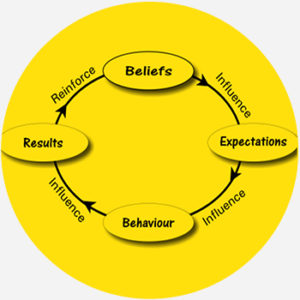Pop Culture dictionary
self-fulfilling prophecy
or self fulfilling prophecy [self-foo l-fil-ing prof-uh-see]
What does self-fulfilling prophecy mean?
A self-fulfilling prophecy is a prediction that causes itself to be true due to the behavior (including the act of predicting it) of the believer. Self-fulling, here, means “brought about as a result of being foretold or talked about,” while prophecy refers to the prediction.
Where does self-fulfilling prophecy come from?

Predictions about the future are often little more than guesses based on the best information available. A self-fulfilling prophecy, on the other hand, comes true precisely because someone thought it up and predicted it. Due to their own biases, the predictor may unconsciously take actions that cause the prediction to happen, for better or worse.
An everyday example can be found in sports. If a player enters a game certain that they will lose, it can cause a psychological feedback loop where he plays the game poorly, causing the loss predicted and resulting in a self-fulfilling prophecy.
The concept of an individual’s expectation of success or failure in causing their own victory or downfall has long been the subject of literature and legend. Use of the term self-fulfilling prophecy, however, goes back to at least 1832.
Credit for popularizing the term, and strictly defining it, goes to American sociologist Robert Merton. In his 1948 essay titled “The Self-Fulfilling Prophecy,” Merton described the concept as “A false definition of the situation evoking a new behavior which makes the originally false conception come true.” Merton was directly inspired by the famous theorem of fellow sociologist William Thomas, who wrote “If men define situations as real, they are real in their consequences.”
Following this, the phrase (as defined by Robert Merton) was used often by sociologists. Today, the term appears in everything from essays and literature to popular music and casual conversation. The term, while common, is still considered a learned one.
Examples of self-fulfilling prophecy
Who uses self-fulfilling prophecy?
Historically, a self-fulfilling prophecy was contrasted with a self-defeating prophecy, the former signifying a positive outcome and the latter negative. Self-fulfilling prophecy now covers both situations, though the phrase is generally reserved for undesirable experiences and therefore carries a negative connotation.
When discussed in academic or technical contexts, self-fulfilling prophecy is sometimes shortened to SFP.
The phrase is now widely used outside of such formal settings. In colloquial speech and writing, self-fulfilling prophecy is often used less strictly as a way of explaining some fault or failure in the face of previous warning signs (e.g., “I told you so”).
Note
This is not meant to be a formal definition of self-fulfilling prophecy like most terms we define on Dictionary.com, but is rather an informal word summary that hopefully touches upon the key aspects of the meaning and usage of self-fulfilling prophecy that will help our users expand their word mastery.